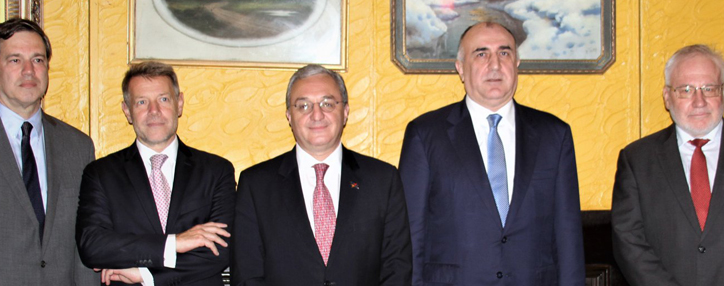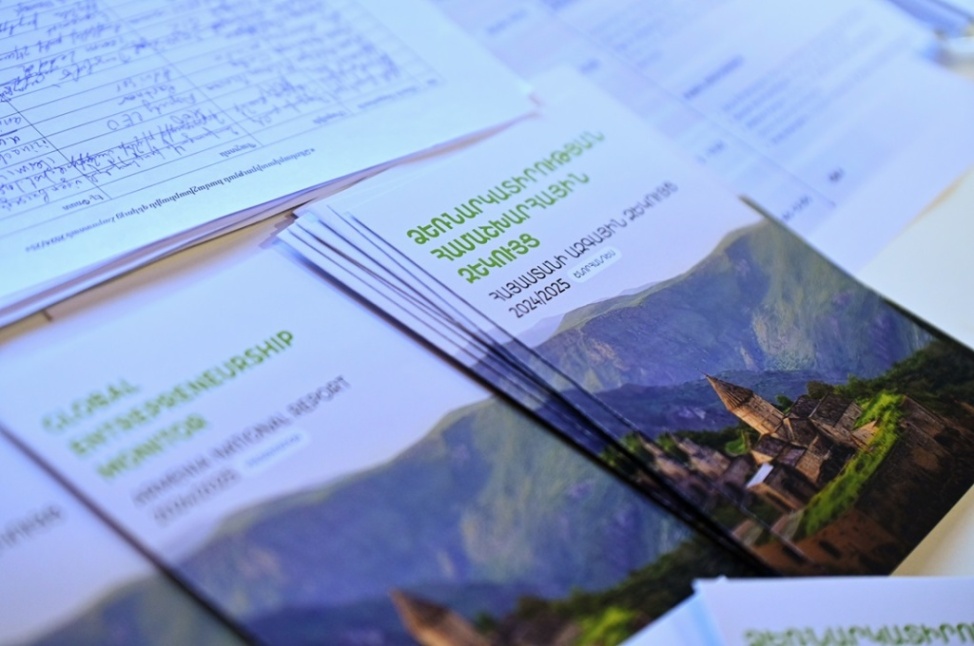Armenian, Azerbaijani foreign ministers and OSCE Minsk Group co-chairs discussed ways to reduce tension in Karabakh conflict zone
26.09.2019,
10:28
The Co-Chairs of the OSCE Minsk Group (Igor Popov of the Russian Federation, Stéphane Visconti of France, and Andrew Schofer of the United States of America) met separately and jointly with Azerbaijani Foreign Minister Elmar Mammadyarov and Armenian Foreign Minister Zohrab Mnatsakanyan on the margins of the UN General Assembly, the OSCE Minsk Group said in a statement.

YEREVAN, September 26. /ARKA/. The Co-Chairs of the OSCE Minsk Group (Igor Popov of the Russian Federation, Stéphane Visconti of France, and Andrew Schofer of the United States of America) met separately and jointly with Azerbaijani Foreign Minister Elmar Mammadyarov and Armenian Foreign Minister Zohrab Mnatsakanyan on the margins of the UN General Assembly, the OSCE Minsk Group said in a statement.
It said the Co-Chairs were joined in their meetings by the Personal Representative of the OSCE Chairperson-in-Office, Andrzej Kasprzyk. They also met with OSCE Secretary General Thomas Greminger, OSCE Chairperson-in-Office, Slovak Foreign Minister Miroslav Lajčák, and senior officials of the United Nations.
The Co-Chairs briefed the two Ministers on their activities since the joint meeting in Washington in June, including recent consultations in Paris and Geneva on the humanitarian and security dimensions of the conflict.
The Co-Chairs noted the positive effects of the sides’ efforts to minimize violence during the summer period, including the use of the existing direct communication links, and expressed deep regret over the recent fatality.
The Co-Chairs and the Ministers continued their discussion of additional measures to reduce tensions and sustain an atmosphere conducive to peace and favorable to substantive talks. Recalling their 9 March statement, the Co-Chairs encouraged the sides to minimize the use of rhetoric that is inflammatory or prejudges the outcome of negotiations.
The Co-Chairs intend to visit the region in the near future.
The Nagorno-Karabakh conflict erupted into armed clashes after the collapse of the Soviet Union in the early 1990s as the predominantly Armenian-populated enclave of Azerbaijan sought to secede from Azerbaijan and declared its independence backed by a successful referendum.
On May 12, 1994, the Bishkek cease-fire agreement put an end to the military operations. A truce was brokered by Russia in 1994, although no permanent peace agreement has been signed. Since then, Nagorno-Karabakh and several adjacent regions have been under the control of Armenian forces of Karabakh. Nagorno-Karabakh is the longest-running post-Soviet era conflict and has continued to simmer despite the relative peace of the past two decades, with snipers causing tens of deaths a year.
On April 2, 2016, Azerbaijan launched military assaults along the entire perimeter of its contact line with Nagorno-Karabakh. Four days later a cease-fire was reached. -0---
It said the Co-Chairs were joined in their meetings by the Personal Representative of the OSCE Chairperson-in-Office, Andrzej Kasprzyk. They also met with OSCE Secretary General Thomas Greminger, OSCE Chairperson-in-Office, Slovak Foreign Minister Miroslav Lajčák, and senior officials of the United Nations.
The Co-Chairs briefed the two Ministers on their activities since the joint meeting in Washington in June, including recent consultations in Paris and Geneva on the humanitarian and security dimensions of the conflict.
The Co-Chairs noted the positive effects of the sides’ efforts to minimize violence during the summer period, including the use of the existing direct communication links, and expressed deep regret over the recent fatality.
The Co-Chairs and the Ministers continued their discussion of additional measures to reduce tensions and sustain an atmosphere conducive to peace and favorable to substantive talks. Recalling their 9 March statement, the Co-Chairs encouraged the sides to minimize the use of rhetoric that is inflammatory or prejudges the outcome of negotiations.
The Co-Chairs intend to visit the region in the near future.
The Nagorno-Karabakh conflict erupted into armed clashes after the collapse of the Soviet Union in the early 1990s as the predominantly Armenian-populated enclave of Azerbaijan sought to secede from Azerbaijan and declared its independence backed by a successful referendum.
On May 12, 1994, the Bishkek cease-fire agreement put an end to the military operations. A truce was brokered by Russia in 1994, although no permanent peace agreement has been signed. Since then, Nagorno-Karabakh and several adjacent regions have been under the control of Armenian forces of Karabakh. Nagorno-Karabakh is the longest-running post-Soviet era conflict and has continued to simmer despite the relative peace of the past two decades, with snipers causing tens of deaths a year.
On April 2, 2016, Azerbaijan launched military assaults along the entire perimeter of its contact line with Nagorno-Karabakh. Four days later a cease-fire was reached. -0---



